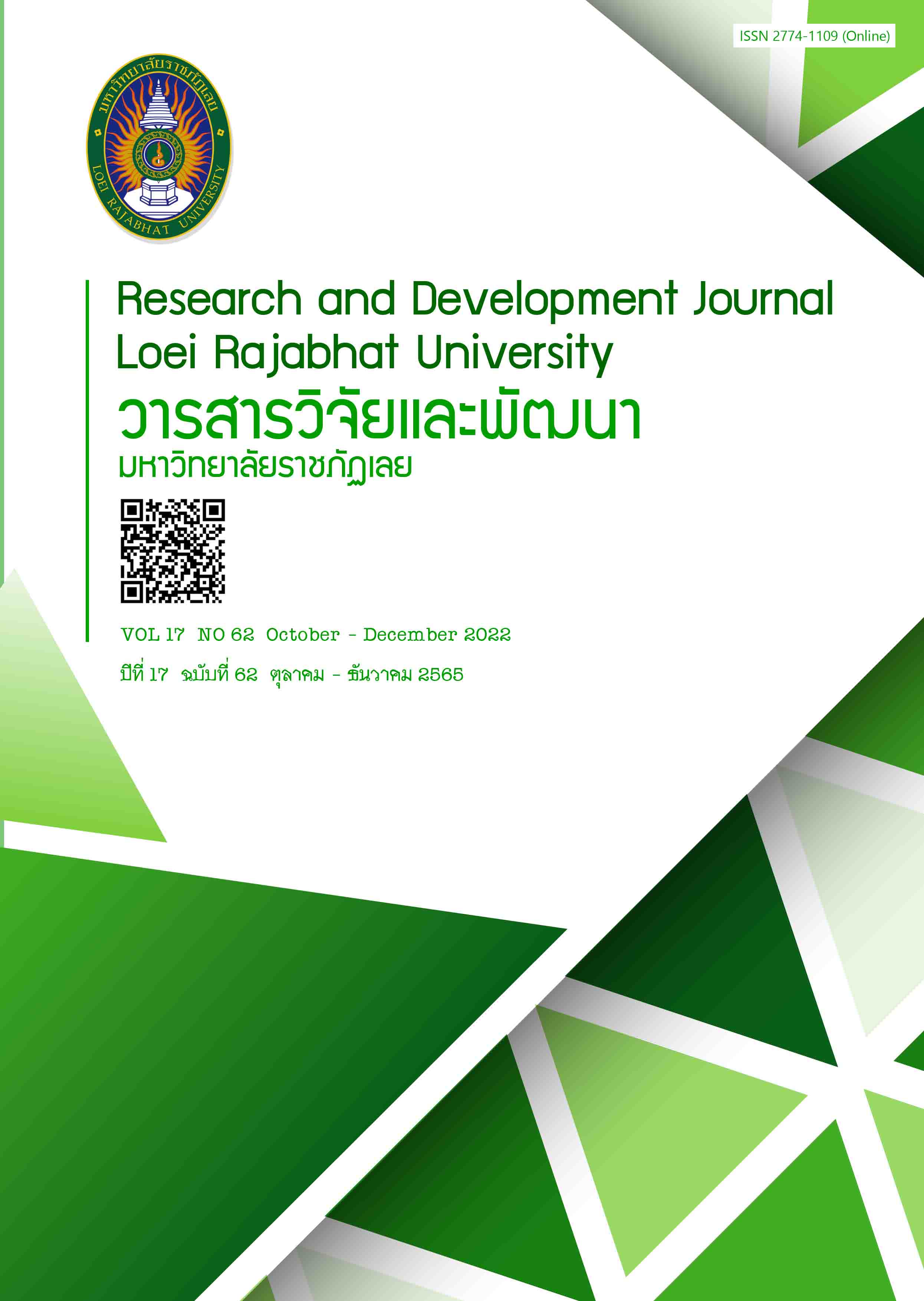Safety Standard in Tourist Attraction That Affects to the Trust of Foreign Tourist in Yaowarat Business Area
Keywords:
safety standard in tourist attraction, trust, foreign tourist, Yaowarat business areaAbstract
The objectives of this research aimed to: 1) study about safety standard in tourist attraction and the trust of foreign tourists; and 2) study about safety standard in tourist attraction that affects to the trust of foreign tourists. A sample of this study had 138 samples which came from *Gpower program. The data was collected from foreign tourists who came to Yaowarat business area during COVID-19 1st – 3rd wave. The statistics for analyzing data was the descriptive statistics, percentage, mean, standard deviation, Pearson’s correlation coefficient & multiple regression analysis. The results were showed that: 1) the level of elements of safety in tourist attraction, when classified every aspect, it found that most concerning was the fairness aspect. The inferior concerning that was classified was entrepreneur’s administration aspect, the service aspect, the government’s management aspect and the hygiene aspect; and 2) Independent variable; entrepreneur’s administration aspect and the government’s management aspect that affects to the trust of foreign tourists in Yaowarat business area.
References
กรมการท่องเที่ยว กระทรวงการท่องเที่ยวและกีฬา. (2564). คู่มือหลักเกณฑ์ด้านความปลอดภัยในพื้นที่ท่องเที่ยวปลอดภัย สำหรับนักท่องเที่ยว. กรุงเทพฯ: กรมการท่องเที่ยว.
กรมควบคุมโรค. (2564, 7 กรกฎาคม). แนวปฏิบัติเพื่อป้องกันการแพร่ระบาดของโรคโควิด 19 ในร้านอาหารและสถานบันเทิง สำหรับผู้ประกอบการและผู้ใช้บริการ. สืบค้นจาก https://ddc.moph.go.th/viralpneumonia/file/int_operator/int_operator22_050164.pdf.
กระทรวงการท่องเที่ยวและกีฬา. (2564, 12 ตุลาคม). สรุปสถานการณ์พักแรม จำนวนผู้เยี่ยมเยือน และรายได้จากผู้เยี่ยมเยือน เดือนมกราคม - กันยายน 2564 (ปรับปรุงรายได้เดือน ม.ค. - ก.ย. 2564). สืบค้นจาก https://mots.go.th/download/article/article_20210819203823.xlsx.
ขวัญฤทัย เดชทองคำ. (2563). ความสำคัญของคุณภาพการบริการสู่ความสำเร็จของธุรกิจท่องเที่ยวภายใต้วิกฤติ COVID-19. วารสารวิทยาศาสตร์การกีฬาและสุขภาพ, 21(3), 317-326.
เดลินิวส์. (2565, 30 เมษายน). ดับฝัน ฟื้นเศรษฐกิจย่านฮิตปีใหม่ “ข้าวสาร-เยาวราช” ทรุด. สืบค้นจาก https://d.dailynews.co.th/bangkok/815933/
ตราดุลย์ นรนิติผดุงการ และ นฤมล อนุสนธิ์พัฒน์. (2563). การเปลี่ยนแปลงทางการเมืองที่ส่งผลกระทบต่อการท่องเที่ยวไทย. วารสารมหาจุฬานาครทรรศน์, 7(4), 174-189.
ทัศติยะ เต็มสุริยวงศ์ และ ศยามล เจริญรัตน์. (2564). การเปลี่ยนผ่านของย่านเยาวราชกับบทบาทด้านการท่องเที่ยวเชิงวัฒนธรรมและการปรับตัวของการท่องเที่ยวในสภาวะการแพร่ระบาดโควิด-19. วารสารมหาจุฬานาครทรรศน์, 8(7), 432-446.
นพรัตน์ บุญเพียรผล และ พรทิพย์ เรืองธรรม. (2564). แนวทางการบริหารจัดการด้านการท่องเที่ยวที่ปลอดภัยเพื่อรองรับนักท่องเที่ยวในพื้นที่เกาะยอ อำเภอเมือง จังหวัดสงขลา. Journal of Arts Management, 5(3), 827-844.
บัณฑิต ชัยวิชญชาติ. (2563). อุปสงค์การท่องเที่ยวกับภาวะเศรษฐกิจ. BU ACADEMIC REVIEW, 19(1), 173-186.
ศุศภราภร แต่งตั้งลำ และ อริยา พงษ์พานิช. (2564). ปัจจัยที่มีผลต่อการเลือกการเดินทางท่องเที่ยวไทยแบบปรกติใหม่. วารสารสหวิทยาการมนุษยศาสตร์และสังคมศาสตร์, 4(1), 12-24.
เอกชัย ชำนินา. (2563). ความสามารถของภาครัฐกับการจัดการท่องเที่ยวภายใต้สถานการณ์โรคติดต่อเชื้อไวรัสโคโรนา 2019 (COVID-19). วารสารสังคมศาสตร์และมานุษยวิทยาเชิงพุทธ, 5(11), 420-433.
Faul, F., Erdfelder, E., and Buchner, A. (2017). G*Power 3: A flexible statistical power analysis program for the social, behavioral, & biomedical sciences. Behavior Research Methods, 39 (2), 175-191.
Nahler, G. (2009). Pearson correlation coefficient in Dictionary of Pharmaceutical Medicine. Springer: Vienna.
Ozdemir, A. M., and Yildiz, S. (2020). How Covid-19 Outbreak Affects Tourists’ Travel Intentions? A Case Study In Turkey. International Social Mentality & Researcher Thinkers Journal, 6(32), 1101-1113.
Shin, H., Nicolau, J. L., Kang, J., Sharma, A., and Lee, H. (2021). Travel decision determinants during and after COVID-19: The role of tourist trust, travel constraints, and attitudinal factors. Tourism Management, 88(2022), 1-14.
Downloads
Published
How to Cite
Issue
Section
License
Copyright (c) 2022 Research and Development Journal, Loei Rajabhat University

This work is licensed under a Creative Commons Attribution-NonCommercial-NoDerivatives 4.0 International License.
ข้อความที่ปรากฎในวารสารฉบับนี้เป็นความคิดเห็นของผู้เขียนแต่ละท่าน สถาบันวิจัยและพัฒนา มหาวิทยาลัยราชภัฏเลย และกองบรรณาธิการ ไม่จำเป็นต้องเห็นด้วยและไม่มีส่วนรับผิดชอบใดๆ
สถาบันวิจัยและพัฒนา มหาวิทยาลัยราชภัฏเลย ขอให้ผู้อ่านอ้างอิงในกรณีที่ท่านคัดลอกเนื้อหาบทความในวารสารฉบับนี้






